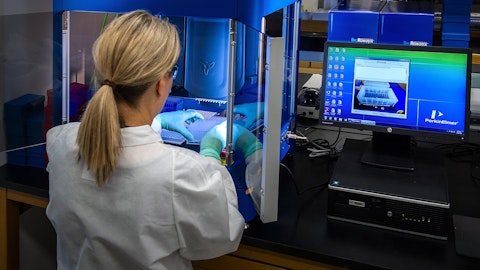Jack Khattar : The first two generics that filed on Oxtellar XR, TWI and ACTAVIS, which is now Teva. We actually went to court on these two cases, and we won in both cases all the way through appeal. So that is correct. That was back in 2016, the ‘2017 timeframe when those cases were resolved actually in our favor. So, this is a second wave of generics that have filed in the last two to three years, and we are in litigation with the second wave of the generics.
David Amsellem: Okay. That’s helpful. Thank you, Jack.
Operator: Okay. Thank you for the question. . Our next question comes from Annabel Samimy of Stifel. Your line is now open.
Jack Padovano: Hi. This is Jack on for Annabelle. Thanks for taking our questions. Could you talk a little bit about the GOCOVRI launch and how that’s going relative to your expectations? You seem to have a pretty refined message that you can treat both the off episodes and the dyskinesia. Are physicians receptive to that or do they only want to talk about how to maximize treatment of the off period? Is there any friction there?
Jack Khattar : Yes. Sure. I mean, we have been very pleased with the GOCOVRI and the response we have been getting from the market from physicians regarding the unique positioning of the product. It’s a unique profile, which is — it’s the only product in Parkinson’s that is approved to treat dyskinesia and of episodes. And obviously, this quarter also was fairly solid given again it’s the first quarter, which typically we have the headwinds of insurance and everything else that goes on in our business in the first quarter. We are very happy with GOCOVRI delivering 15% growth versus last year. And that’s on top of the 19% growth that it delivered last year. And as far as the message itself and the positioning, it really depends on the physician, their practice, and how they treat Parkinson’s.
Are they actually movement disorder specialists or are there general neurologists? So, the discussion in the physician’s office sometimes is a little bit different depending on the specialty. But overall, there is a lot of education that has to occur and that we continue to do that from a market education perspective, really helping physicians to discuss the real issues bring up the issue of dyskinesia. Patients sometimes on their own, they are not aware that actually dyskinesia is caused by a lot of the medications they are on. They might think actually dyskinesia is part of the disease and therefore they don’t raise it, they don’t talk about it, they don’t ask physicians about it, physicians don’t ask the patients about it. So, we try to improve the education in the marketplace to make sure that is brought up in the conversation between the patient and the physician.
So that people can be aware of the fact that it is an issue. It can be dealt with, there is a product that actually treats it and not only treat dyskinesia but also treat the off episode, and there is really no need to have a tradeoff here between the efficacy of a lot of these Parkinson’s agents specifically levodopa/carbidopa, what we’re talking about here, there is really no need for the physician to taper off or reduce the dose of levodopa/carbidopa to get rid of dyskinesia. You can always add GOCOVRI to treat the dyskinesia, but even also get the efficacy of episodes at the same time. So, it’s a beautiful solution that people if they really understand the situation, they can have great results with the GOCOVRI. So, it’s just a matter of continued education, and continued push that unique positioning that GOCOVRI holds in the market.
And I think so far, the results speak for themselves, as far as the uniqueness of the product and its continued benefit in the marketplace.





